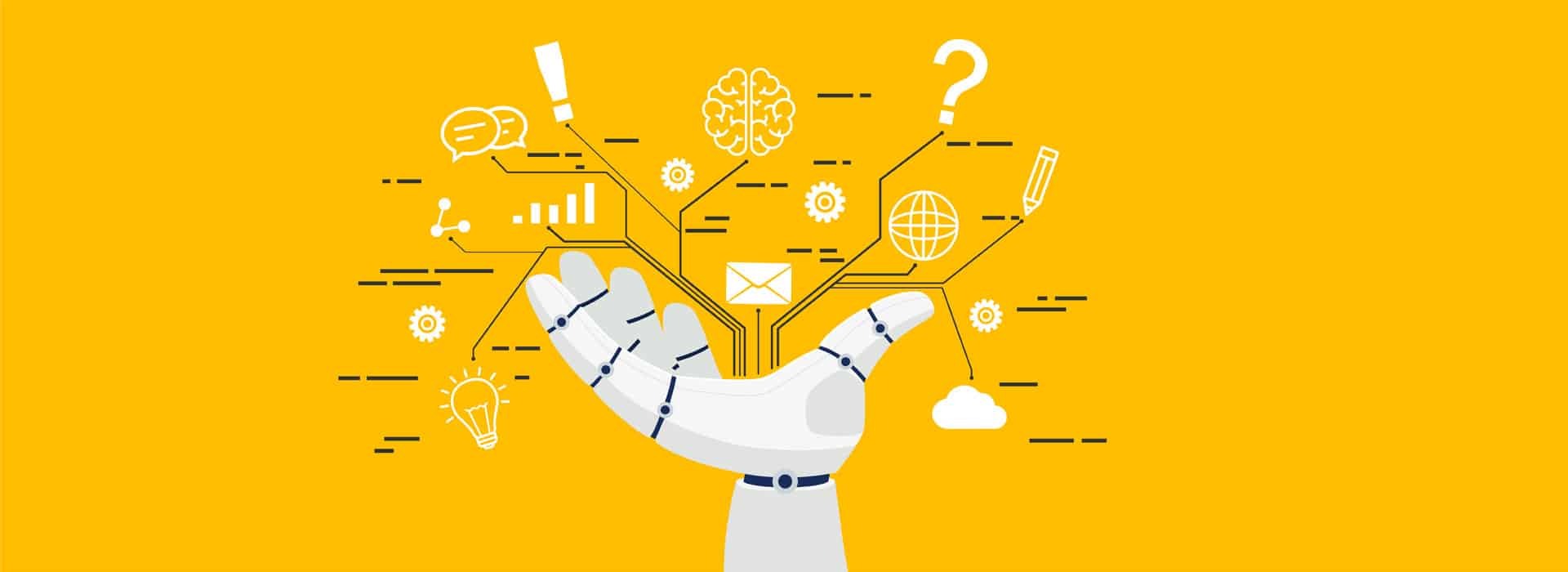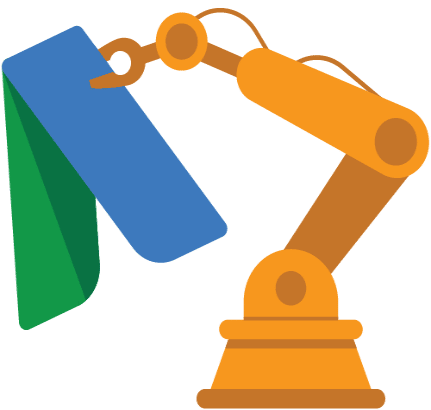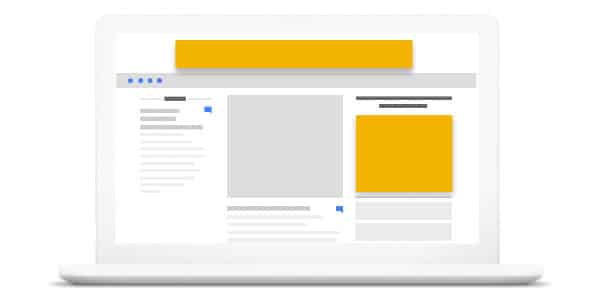Automation in Digital Marketing is to be embraced, not feared.

There’s no denying that technology and automation are impacting your everyday life.
You go grocery shopping and use self-checkouts. You can order McDonalds off the screen, not the counter.
Even Amazon have opened supermarkets with no checkouts, using tracking technology to know what customers removed from the shelves and charging their account as they left the store.
But change is a natural part of life. It may shut some jobs down, but it will always open new ones up. Think about it.
It’s Not Humans VS Robots…
There are articles that claim that machines are better than humans at PPC, 80% of the time. But that’s not entirely accurate. The premise feeds into this annoying myth that we seem to be at war with technology.
We’re not. It’s not us vs them.
Why? Because no matter how good automation and AI gets, it may never have empathy, creativity or emotion.
If robots start developing a heart, then maybe it’ll be time for us to worry about our jobs.
People buy with emotion. Without intrigue, they wouldn’t click on the ad. Without passion, desire or even fear, they wouldn’t convert. It takes a human to understand this emotion when advertising to customers.
Take shaving razors for example…
The real reason customers buy razors is because they want to feel good about themselves. Because they’re nervous about a job interview and want to make the best first impression. Because they’ve got a brand new red sparkly dress for a wedding anniversary and want the confidence to wear it.
What makes a great PPC agency isn’t just knowing how to set up campaigns. It’s having the creativity and understanding to really connect with what customers want and create engaging adverts that they’ll actually want to click.

Now the advert above isn’t bad. But there’s no emotion in it. It’s bland and doesn’t give the customer a reason to explore more.

There’s so much more emotional string-pulling. It connects to what the audience wants, making it far more engaging than the first example.
This creativity will not easily be replaced by a machine.
Sink or Swim
Once you’ve accepted that automation isn’t going to take your job, some people then decide to just ignore it and carry on as normal anyway — as if sticking your head in the sand was a way to solve any of life’s problems.
The truth is if you don’t embrace automation, your PPC agency will be in trouble.
Automation is the future of PPC. It’s designed to save you time on manual processes and make it easier than ever to do your job, without competing with you for it.
Just take a minute to think about what you do every week. I bet in there, there’s so many jobs that you wish you could speed up. Tasks that are repetitive and take up too much valuable time to complete.
Taking the Automation Plunge
If you’re smart, you’ll make the choice to bring automation into your business.
The best way to do this! Think of where most of your time is wasted right now, then get into the market and check out and test the available automation. There’s bound to be one (or more!) of them that will work perfectly for your business.
Types of PPC automation:
- Automated rules to remove repetitive tasks through custom rules so you’ve got more time to dedicate yourself to other aspects of your business
- Custom alerts to keep you in the loop, so you have full control over your PPC campaigns.
- Scripts
- Automated bid management (Maximise conversions, target CPA, target ROAS)
- Automating PPC reporting (We create bespoke datastudio dashboards for our PPC clients)

Automating Bid Management
PPC marketers still relying on a fully manual bid management process are now few and far between. Manually managing bids is hugely time-intensive and inefficient considering the number of options available to automate bid management currently accessible on even the smallest budgets.
Some bid management methods are slightly more advanced than others. Entry level bid management can be achieved by using automated bid management options available on Google ads, indeed even automated rules can work for smaller accounts.
It’s no secret that Google is keen for advertisers to use their automated bidding strategies in campaigns. Their smart bidding features use advanced machine learning to amend bids based on a wide range of real-time signals including device, location, time of day, remarketing list, language and operating system.
Layering Auto Bidding with Relevant Scripts
Layering smart bidding with management scripts that factor in client specific data such as seasonality, stock levels and other factors is a great way of using automation.

One example of how scripts can help automate bid management alongside auto bidding strategies is considering client-specific data such as product level profit margin. Within the data feed for Google Shopping, custom labels can be used to identify the profitability of products. For example, labels such as 0-10 percent, 10-20 percent, 20-30 percent, etc., are passed through to Google Shopping to split products by profitability.
Bids can then be automatically increased or decreased hourly to align with the profitability of a product compared to the average profitability across all products. For example, if a profit had half the margin as average, then the bid would be halved and if another product had triple, then the bid would be tripled.

Automating Ad Copy
For larger accounts ad copy creation will be a time-consuming process. However, there are some ways this can be automated to save yourself time.
Dynamically generate ads based on your website content – DSA
Google dynamic search ads (DSAs) enable advertisers to automatically target and generate ads based on their website content.
A good way of expanding accounts but crucially DSA’s don’t have the same level of control or the level of targeting options as keyword-targeted campaigns.
Create ads based on data feeds using Google Scripts
Creating ads for larger accounts using Google Scripts is recommended over DSAs. However, you will need to have an up-to-date product data feed and in-depth knowledge of Google sheets to use this method.
Automating PPC Reporting
There are a variety of free options available to PPC marketers for report automation.
Each of our clients now have a completely unique & branded PPC dashboard created in Datastudio which they can easily use to access real time data or a performance data in a specific custom date range.
If you’re still manually recording performance statistics from your PPC accounts, then I’d strongly recommend giving one of the options above a try to save yourself countless hours of time each day/week/month building out Excel sheets – a little time upfront to customise and automate a dashboard will save you a substantial amount of time over the long term.
Is There Anything Automation Can’t Do?
The most successful PPC advertisers will utilise the strengths of automation but use their own intelligence to take results to the next level.
While automation and machine learning allow for far smarter ad campaigns, they still need a well-considered, human approved strategy to deliver results. For successful Google ads optimisation, a skilled PPC account manager needs to manage the following aspects:
- TOPLINE STRATEGY : There is no automation tool in place that can plan out the overarching strategy behind your PPC campaign. While automation can help a strategy come to fruition, only a human can plan your budgets and targeting in relation to your business offering and goals.
- TRACKING : Automation is nothing without correct tracking. For Google to understand your business goals, whether they’re online sales, leads or sign-ups, your website needs to be tagged up accurately.
- SPLIT TESTING : Smart bidding is one of Google’s main automated services and uses machine learning to optimise for conversions or conversion value in each Google Ads auction. However, the algorithms behind smart bidding are still learning and need data to be segmented to get the best results.
- AD CREATION : While creating and testing new ads is another area that automation can assist with – it cannot completely overthrow it. Only you truly understand your business offering and can write ad copy that projects your core messages. This is still a cornerstone of PPC.
- DATA INTERPRETATION : Then there’s the data. All that lovely PPC data. Without it, machine learning wouldn’t exist, but it still needs to translate into ROI for you. You need to keep on top of your product margins, return on ad spend and larger business goals, making sure that all this marketing activity is impacting your bottom line.
In conclusion….
This article outlines just a few ways in which you can harness the power of automation and machine learning to both deliver improved results and more efficiently manage PPC accounts.
Automation can provide us with analysis and management assistance at a scale that humans aren’t capable of providing in the same timescale, saving us time to focus on the bigger picture for clients.
One worthwhile action after reading would be to assess where your biggest “time vampires” are in your daily PPC management routine and identify processes which could technically be automated to save you time to add value to your accounts.
LAW Creative is one of Europe’s leading integrated marketing agencies. If you are seeking Smart Thinking and improved results against your current digital marketing activities, please contact brett.sammels@lawcreative.co.uk
LAW Creative part of Selbey Anderson Group of agencies.
